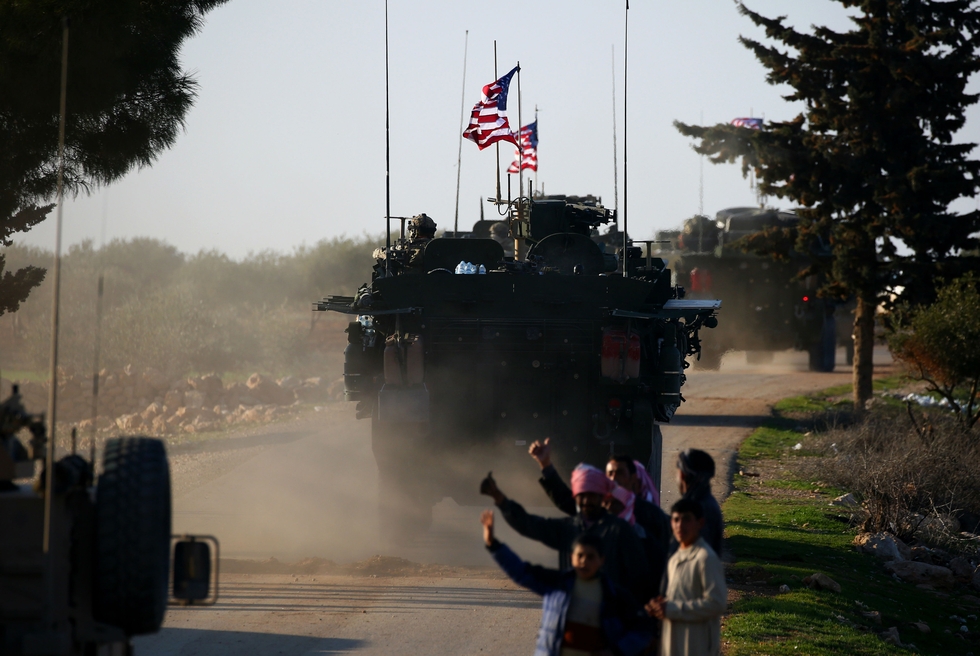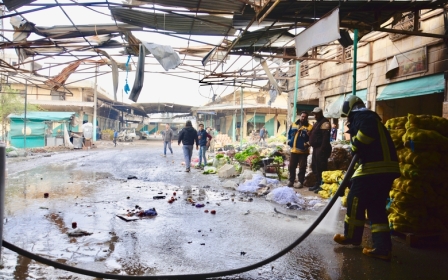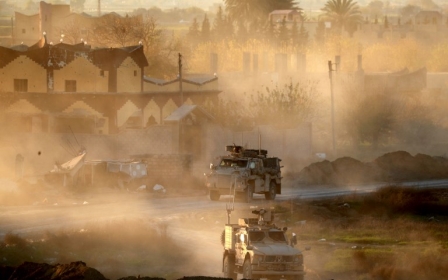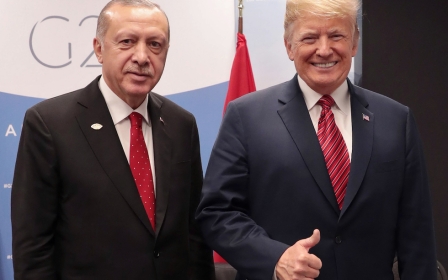US announces withdrawal from Syria as Trump declares Islamic State defeated

WASHINGTON - US forces have started to withdraw from northeastern Syria, the White House and Pentagon said on Wednesday, in an unexpected move ahead of an anticipated Turkish offensive east of the Euphrates River against the United States' pro-Kurdish allies.
The US has at least 2,000 troops stationed in the region, where it has also waged an aerial campaign in support of the Kurdish-led Syrian Democratic Forces (SDF) in the fight against the Islamic State (IS) group.
The White House said on Wednesday that it had already started withdrawing troops as the battle against IS was moving into a new phase.
"These victories over ISIS in Syria do not signal the end of the global coalition or its campaign. We have started returning United States troops home as we transition to the next phase of this campaign," White House spokeswoman Sarah Sanders said in a statement, referring to the group by another acronym.
Washington is also evacuating all State Department employees from Syria within 24 hours, Reuters reported, citing a US official.
US President Donald Trump announced the defeat of IS in Syria on Twitter on Wednesday morning, while officials told news agencies that a withdrawal was imminent.
"We will ensure force protection is adequately maintained, but as quickly as possible," an official told the AFP news agency, referring to the US withdrawal.
Contradicting Trump's claim, France's defence minister said on Thursday that Islamic State had been weakened but not been wiped from the map in Syria and that the fight to defeat them definitively in their remaining pockets needed to carry on.
"Islamic State has been weakened more than ever," Florence Parly said on Twitter.
"But Islamic State has not been wiped from the map nor has its roots. It is necessary that the last pockets of this terrorist organisation be definitively defeated militarily."
France is a leading member of the US-led coalition fighting in Syria and Iraq and has around 1,000 troops including special forces based in the north of the country, deployed alongside local Kurdish and Arab forces.
Trump's comments also appear to fly in the face of the US State Department's assertion earlier this week that the fight against IS was not yet completed in Syria.
"The United States and Turkey are coordinating actively on all issues affecting both Turkish security and the situation in northeast Syria, where, of course, as you know, US forces are present in the campaign to ensure the enduring defeat of ISIS," said State Department deputy spokesman Robert Palladino.
"We’ve made significant progress recently in the campaign – but the job is not yet done," he told reporters on Tuesday.
'Devastating consequences'
Republican Senator Lindsey Graham said prior to the White House's announcement that any decision to withdraw troops would be a mistake.
“An American withdrawal at this time would be a big win for ISIS, Iran, Bashar al-Assad of Syria, and Russia. I fear it will lead to devastating consequences for our nation, the region, and throughout the world," Graham said in a statement.
"It will make it more difficult to recruit future partners willing to confront radical Islam. It will also be seen by Iran and other bad actors as a sign of American weakness in the efforts to contain Iranian expansion."
Marco Rubio, another Republican senator, said a hasty withdrawal from Syria would be a "grave error", with consequences beyond defeating IS.
Later on Wednesday, Turkish Foreign Minister Mevlut Cavusoglu spoke to his US counterpart over the phone about the US troop withdrawal, Turkey's state-run Anadolu news agency reported, without going into further detail.
Earlier in the day, the White House's decision was welcomed by Russia's Foreign Ministry, which said the withdrawal creates prospects for a political settlement of the crisis in Syria, TASS news agency reported.
Israel will study the US decision to pull its forces from Syria and will ensure its own security, Israeli Prime Minister Benjamin Netanyahu said on Wednesday.
Netanyahu, in a statement, said he had spoken over the past two days with Trump and the US secretary of state about their intention to withdraw from Syria.
"They made clear they have other ways to have influence in the area," Netanyahu said.
"We will study the timeline, how it will be done and of course the implications for us.
"In any case, we will make sure to maintain Israel's security and protect ourselves from this arena."
Pentagon confirms pull-out
The US Defence Department confirmed on Wednesday that it had started the process of pulling US troops from Syria.
"The Coalition has liberated the ISIS-held territory, but the campaign against ISIS is not over," Pentagon spokeswoman Dana White said in a statement.
"We have started the process of returning US troops home from Syria as we transition to the next phase of the campaign," she said.
The Pentagon vowed to continue working with its partners in the region to defeat IS "wherever it operates".
Trump has been pushing for a Syria withdrawal for the past few months, with Pentagon officials countering his assertions that the fight against IS was over.
"We're knocking the hell out of ISIS. We'll be coming out of Syria like very soon. Let the other people take care of it now," the US president said late in March.
In April, Brett McGurk, the special US envoy for the global coalition against IS, said the US military's mission in Syria "isn't over", stressing that troops are going to "complete that mission".
More hawkish US officials have been advocating a greater US military presence in Syria to counter Iranian influence in the war-torn country.
"We’re not going to leave as long as Iranian troops are outside Iranian borders and that includes Iranian proxies," White House national security adviser John Bolton said in September.
'Dream scenario for ISIS'
The SDF has been the main US partner on the ground in Syria in the fight against IS, but the alliance has infuriated NATO ally Turkey, which sees the SDF - which is heavily dominated by the pro-Kurdish People's Protection Units (YPG) - as a threat to its national security.
Ankara has repeatedly threatened to target YPG forces east of the Euphrates river, particularly those based in and around the city of Manbij.
Turkish President Recep Tayyip Erdogan said on Monday that Trump had "responded positively" to Turkey's demand for the YPG to leave Manbij.
"We talked to Trump. He responded positively," said Erdogan, speaking at an event in the southern Turkish city of Konya.
Geopolitically, this is not just a dream scenario for ISIS, but also for Russia, Iran and the Assad regime, all of whom stand to benefit substantially from a US withdrawal from Syria
- Charles Lister, analyst
"These terrorists have to go to the east of the Euphrates. If they do not leave, we will send them. Because they are disturbing us."
Last week Turkey appeared to indicate that an operation was imminent.
Charles Lister, a senior fellow at the Middle East Institute, warned that the withdrawal was further evidence of Trump's "dangerous unpredictability".
"Geopolitically, this is not just a dream scenario for ISIS, but also for Russia, Iran and the Assad regime, all of whom stand to benefit substantially from a US withdrawal from Syria," he said.
"Should the US leave Syria in a matter of weeks, as is now rumored, the Assad regime will rapidly step in to buy the loyalty of our Arab allies in the northeast, breaking them away from the Kurdish PYD, who will in all likelihood be left vulnerable to an imminent Turkish military intervention east of the Euphrates river.
Lister added that it was a "sad state of affairs" that Washington is abandoning its allies who have "shed blood and thousands of lives for our fight against ISIS".
"Trump may well have given this de facto green light to Turkish President Erdogan when they spoke on the phone on Friday."
Middle East Eye propose une couverture et une analyse indépendantes et incomparables du Moyen-Orient, de l’Afrique du Nord et d’autres régions du monde. Pour en savoir plus sur la reprise de ce contenu et les frais qui s’appliquent, veuillez remplir ce formulaire [en anglais]. Pour en savoir plus sur MEE, cliquez ici [en anglais].




